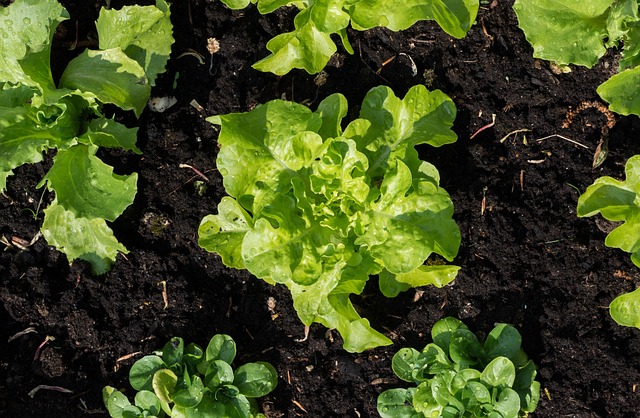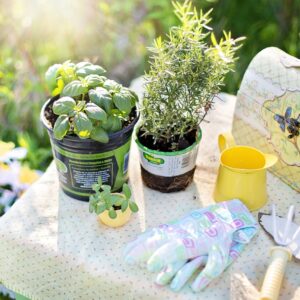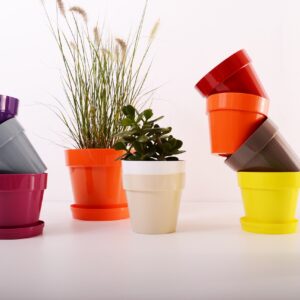
Organic gardening is a sustainable and environmentally friendly approach to gardening that focuses on using natural methods and materials to cultivate plants. Here are the benefits and techniques of organic gardening in detail:
Benefits of Organic Gardening:
- Healthier Soil: Organic gardening prioritizes building and maintaining healthy soil. By using organic matter, such as compost and manure, the soil becomes rich in nutrients, beneficial microbes, and organic matter that improve its structure, fertility, and water-holding capacity.
- Chemical-Free Environment: One of the primary benefits of organic gardening is avoiding the use of synthetic pesticides, herbicides, and fertilizers. This promotes a chemical-free environment, reducing the risk of harmful residues on plants, in the soil, and in the surrounding ecosystem.
- Nutrient-Rich Produce: Organic gardening emphasizes feeding the soil, which in turn nourishes the plants. Organic practices result in nutrient-rich produce with improved taste, aroma, and nutritional content.
- Environmental Conservation: Organic gardening practices minimize the negative impact on the environment. By avoiding synthetic chemicals, organic gardening protects beneficial insects, birds, and other wildlife. It also helps prevent water contamination and supports the overall biodiversity of the ecosystem.
- Cost-Effective: Organic gardening can be cost-effective in the long run. Producing your own compost, using natural pest control methods, and saving seeds from harvested plants can help reduce the need to purchase expensive synthetic fertilizers, pesticides, and seeds.
- Biodiversity Preservation: Organic gardening encourages the preservation of biodiversity by providing a habitat for beneficial insects, birds, and wildlife. By avoiding the use of chemical pesticides and herbicides, organic gardens support the natural balance of predators and prey, resulting in a healthier ecosystem.
- Water Conservation: Organic gardening practices, such as mulching and proper watering techniques, help conserve water. Mulching reduces evaporation and keeps the soil moist, while watering deeply and less frequently encourages plants to develop deep roots, making them more resilient to drought conditions.
- Soil Health and Long-Term Fertility: Organic gardening focuses on building and maintaining healthy soil. By using organic matter like compost and cover crops, organic gardeners enrich the soil with essential nutrients, improve its structure, and enhance its ability to retain moisture. This promotes long-term fertility and reduces the need for synthetic fertilizers.
- Reduced Chemical Exposure: One of the significant advantages of organic gardening is minimizing exposure to harmful chemicals. Synthetic pesticides and herbicides can have detrimental effects on human health and the environment. By avoiding these chemicals, organic gardeners create a safer and healthier environment for themselves, their families, and the surrounding ecosystem.
- Sustainable and Regenerative Practices: Organic gardening is part of a broader movement towards sustainability and regenerative agriculture. By prioritizing natural and organic methods, organic gardeners contribute to the conservation of natural resources, reduce pollution, and promote long-term ecological balance.
Techniques of Organic Gardening:
- Composting: Composting is a fundamental technique in organic gardening. It involves converting kitchen scraps, yard waste, and other organic materials into nutrient-rich compost. Compost improves soil structure, adds nutrients, and enhances moisture retention.
- Natural Pest Control: Organic gardening relies on natural methods to control pests and diseases. This includes encouraging beneficial insects and birds to visit your garden, using physical barriers like netting or row covers, companion planting to repel pests, and making organic pest sprays from ingredients like neem oil or garlic.
- Crop Rotation: Rotate crops each growing season to prevent the build-up of pests and diseases. Different plant families have different nutrient requirements and are susceptible to specific pests, so rotating crops helps maintain a healthy balance in the soil and reduces the risk of recurring problems.
- Mulching: Mulching is the practice of applying a layer of organic material, such as straw, leaves, or wood chips, around plants. Mulch helps suppress weeds, conserve moisture, regulate soil temperature, and provide a slow release of nutrients as it decomposes.
- Organic Fertilizers: Instead of synthetic fertilizers, organic gardening relies on natural fertilizers like compost, well-rotted manure, bone meal, and fish emulsion. These organic fertilizers enrich the soil, release nutrients gradually, and improve the overall health of the plants.
- Water Conservation: Organic gardening promotes water conservation through techniques such as mulching, drip irrigation, and proper watering practices. These methods reduce water evaporation, ensure plants receive adequate moisture, and minimize water wastage.
- Seed Saving: Organic gardeners often save seeds from their best-performing plants to use in future seasons. This preserves heirloom varieties, promotes genetic diversity, and reduces the reliance on commercially produced seeds.
- Soil Care: Organic gardening prioritizes soil health and fertility. Techniques such as cover cropping, crop rotation, and adding organic matter like compost help improve soil structure, retain moisture, and provide essential nutrients to plants.
- Integrated Pest Management (IPM): IPM is a holistic approach to pest control in organic gardening. It involves using a combination of preventive measures, biological controls, and organic pest management techniques to manage pests and diseases effectively. This approach focuses on long-term solutions rather than relying solely on chemical interventions.
- Crop Diversity and Companion Planting: Growing a variety of plant species and practicing companion planting helps deter pests and increase biodiversity in the garden. Some plants naturally repel pests or attract beneficial insects, creating a balanced ecosystem that reduces the risk of pest outbreaks.
- Organic Weed Control: Organic gardeners employ various methods to control weeds without using synthetic herbicides. This includes manual weeding, mulching to suppress weed growth, using weed barriers or landscape fabric, and employing specialized weeding tools.
- Natural Disease Prevention: Organic gardening emphasizes preventing plant diseases through good cultural practices. This includes providing proper plant spacing for adequate airflow, practicing crop rotation, using disease-resistant plant varieties, and maintaining healthy soil conditions to promote strong plant immune systems.
- Soil Testing and Amendments: Regular soil testing helps organic gardeners understand the nutrient levels and pH of their soil. Based on the test results, amendments like organic fertilizers, lime, or sulfur can be added to balance the soil’s pH and provide essential nutrients to the plants.
- Beneficial Insects and Biological Controls: Encouraging beneficial insects, such as ladybugs, lacewings, and parasitic wasps, can help control pests naturally. Organic gardeners create a welcoming environment for these beneficial insects by providing flowering plants, water sources, and shelter. Additionally, they may introduce biological controls like nematodes or bacteria that target specific pests.
- Organic Seed and Plant Selection: Organic gardening often starts with organic seeds and plants. Organic seeds are sourced from plants grown without synthetic pesticides or fertilizers. Choosing organic, non-GMO, and heirloom varieties ensures that the garden is aligned with organic principles from the start.
- Continuous Learning and Improvement: Organic gardening is a journey of continuous learning and improvement. Organic gardeners stay updated on organic gardening practices, attend workshops or classes, and connect with other gardeners to share knowledge and experiences.
By adopting these techniques, organic gardeners can create a sustainable and thriving garden while promoting ecological balance and minimizing harm to the environment. Organic gardening is not only beneficial for the garden and its produce but also contributes to a healthier planet and a more sustainable future.




